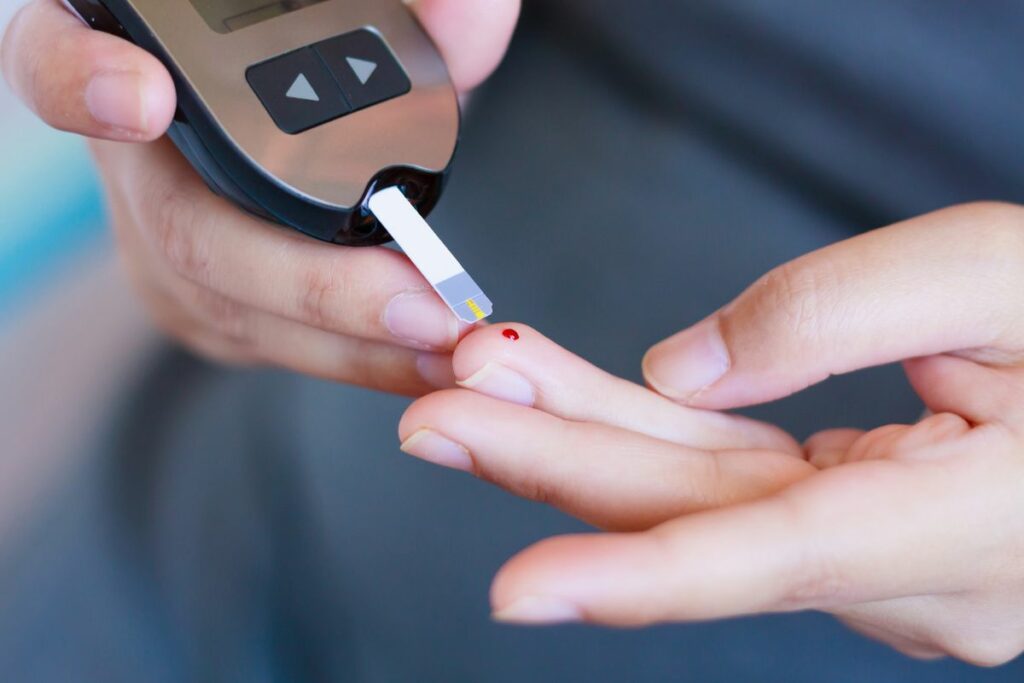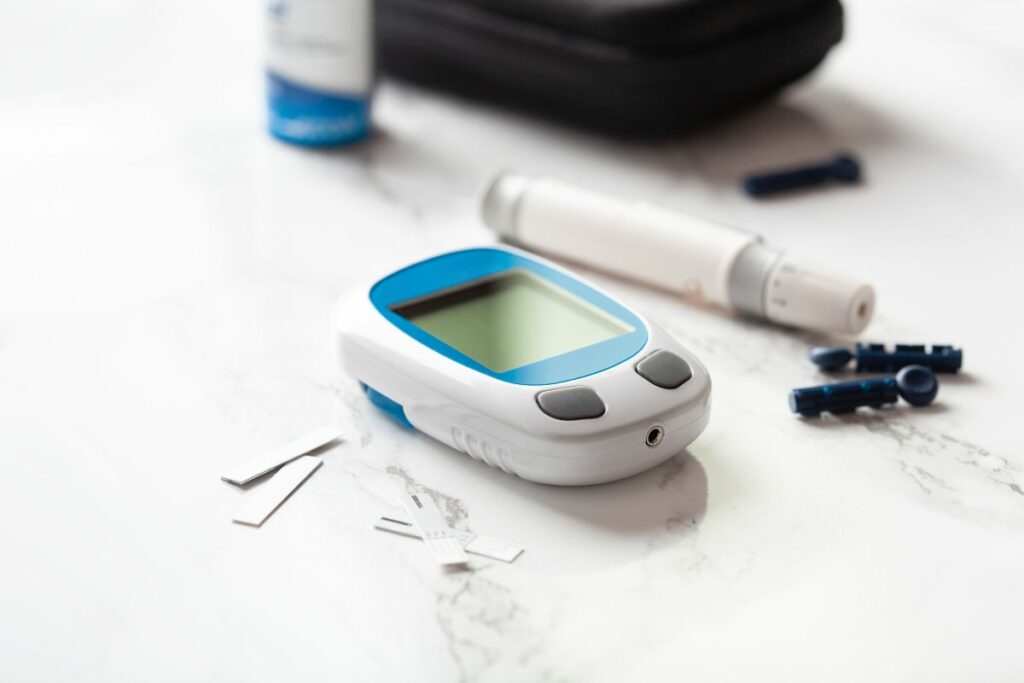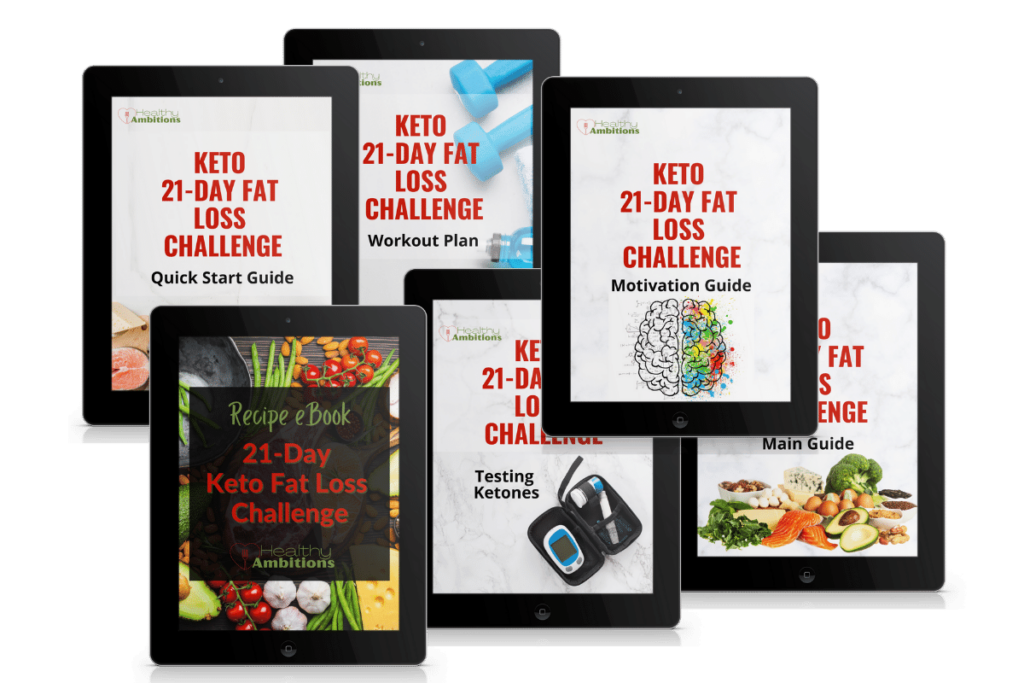How Often Should You Test Your Ketones?
New to the keto world? It’s an exciting place to be! One of the buzzwords you’ll quickly become very familiar with is “ketones.”
These are little molecules that your body starts to produce as you reduce your carb intake. But how do you know if your body is producing ketones?
That’s where testing becomes crucial. Stick with us, and we’ll walk you through the what, why, and how often you should test your ketones, making sure you’re well-prepared as you venture into this new way of eating and fueling your body.

This post may contain affiliate links, which helps keep this content free. Please read our disclosure for more info.
Understanding Ketones and Ketosis
In the world of keto, ketones are more than just a buzzword; they’re essential to understanding the whole process.
When you start cutting back on carbohydrates, your body goes through a significant change. Instead of relying on glucose (sugar) from carbs for energy, it starts burning stored fat.
As this fat is burned, your body produces ketones, molecules that can be used as an alternative energy source. This shift in metabolism, from glucose-burning to fat-burning, leads to a state known as ketosis.
So, why is achieving ketosis such a highlight? Depending on your goals, entering this state can offer a range of benefits:
- Weight Loss: As your body burns through its fat reserves, you might see those numbers on the scale moving down.
- Enhanced Brain Function: Some people find they think clearer and sharper when their brain uses ketones as fuel.
- Improved Energy Levels: Without the sugar highs and lows from carbs, your energy can become more stable throughout the day.
Whether you’re aiming to shed some pounds, seeking better focus, or just wanting a consistent energy level, understanding and achieving ketosis can be a crucial aspect of your new dietary lifestyle.
Related Article: Keto Basics: The Role of Ketones in Your Body
Methods for Testing Ketones

If you’re eager to find out whether you’re in ketosis, there are several methods to help you confirm. Here’s a more detailed look:
Related Article: How to Test Your Ketone Levels for Ketosis (3 Different Methods)
Blood Ketone Meters:
Often considered the gold standard in ketone testing. These devices measure the Beta-Hydroxybutyrate (BHB) levels in your bloodstream.
BHB is a primary ketone body, and its presence in significant amounts indicates that you’re in ketosis. These meters provide precise readings, making them a popular choice among many keto followers.
Recommended Blood Glucose/Ketone Meter: Keto Mojo
Ketone Urine Strips:
Simple and convenient, these strips change color based on the concentration of ketones in your urine. While they’re great for beginners, their accuracy can diminish the longer you’re on keto.
This is because, over time, your body becomes more efficient at utilizing ketones, leading to fewer of them being excreted in the urine.
Breath Ketone Meters:
A more futuristic approach, perhaps? These devices detect acetone levels in your breath, a type of ketone that increases with ketosis.
Not only are they non-invasive, but they’re also reusable. However, while they can give a general indication of ketone levels, they may not be as precise as blood ketone meters.
Choosing the right method largely depends on your preferences and lifestyle. Consider factors like budget, convenience, and the level of accuracy you’re after.
Whatever method you pick, it’s a step forward in understanding your body’s response to keto.
Related Article: The Keyto Breath Meter: The Easiest Way to Measure Ketones!
Factors Influencing Your Test Timing

You’ve got your ketone testing kit, but now you’re wondering when is the best time to use it. The truth is, there’s no one-size-fits-all answer. However, certain factors can guide your decision:
Dietary Adherence:
If you’re stepping into the keto world for the first time, consistent checks can be a great ally. Testing your ketones daily or every other day for the initial weeks can help you gauge if you’re on the right track.
As you become more familiar with how your body responds to different foods, you might space out your tests.
Fitness and Exercise Levels:
Exercise can influence ketone production. For those who sweat it out regularly, testing post-workout can provide valuable insights into how your body is metabolizing fats during physical activity.
Health and Medical Concerns:
For individuals with specific medical conditions or those on certain medications, the rate at which you enter ketosis might differ.
If you fall into this category, it’s vital to collaborate with a healthcare professional. They can guide you on when and how often to test, ensuring you stay safe and informed.
Personal Goals:
Your reason for going keto plays a role in your testing frequency. If weight loss is your primary aim, regular checks can keep you motivated.
On the other hand, if you’re using keto for cognitive or other health benefits, you might find a different testing rhythm more beneficial.
Curiosity and Observing Food Impact:
For the innately curious, tracking how different foods impact your ketosis can be intriguing. By monitoring your ketone levels, you can see firsthand how that avocado toast or that handful of berries influences your readings.
It’s a way to connect the dots between dietary choices and their effects on ketosis. Over time, this data can offer insights, helping you make informed decisions about which foods harmonize best with your keto goals.
If you’ve ever wanted a deeper understanding of your body’s response to what’s on your plate, this approach is tailor-made for you.
Remember, while these factors provide guidelines, the key is to listen to your body and adjust as necessary. It’s all about finding a rhythm that aligns with your goals and lifestyle.
Interpreting Your Results

Once you’ve conducted a ketone test, interpreting the results is the next step. But how can you make sense of the numbers flashing on the screen?
Understanding the Optimal Range: Depending on your goals (weight loss, mental clarity, energy stability), there’s a “sweet spot” range for ketone levels. This range indicates that you’re in ketosis.
It’s beneficial to familiarize yourself with these ranges to better understand if you’re on track.
Dietary Influences: The food you consumed in the past 24 hours can greatly influence your readings. A meal higher in carbs or protein than you’re accustomed to might temporarily lower ketone levels. On the flip side, a high-fat meal could elevate them.
Effects of Fasting: Fasting or prolonged periods without food can elevate ketone levels, as your body taps into its fat reserves for energy in the absence of dietary intake.
Post-Workout Readings: After a vigorous workout, your body might show varying ketone levels. Physical activity can utilize ketones for energy, which may result in a temporary drop in readings immediately after exercise.
Stress and Other Factors: A tough day at the office or personal stressors can also play a role. Stress releases cortisol, a hormone that can affect blood sugar and, in turn, ketone levels.
Consistency is Key: To understand your ketone trends, consistency in testing is essential. By checking at similar times or under similar conditions, you can spot patterns and see how different factors influence your levels over time.
While these numbers provide valuable insights, they’re just one piece of the puzzle. It’s essential to view your ketone readings in the context of your overall well-being, energy levels, mood, and other personal metrics.
And always be ready to adjust and adapt based on what the data, and more importantly, your body, is telling you.
Ketone testing is an exciting tool in your keto toolkit, but remember not to get lost in the numbers. Keep your eyes on the real prize: feeling amazing and living your best life.
FAQ Section (Because Who Doesn’t Love A Good Q&A?)

What’s the best time of day to test?
Many find mornings to be an ideal time since your body has fasted overnight and readings can be more consistent. However, any time that suits your routine works. The key is consistency, so aim to test at a similar time if you’re doing it daily.
Can food and drink mess with my readings?
Yes, they sure can! What you consume can have a direct impact. Whether it’s a hearty meal, a light snack, or even a refreshing beverage, they can alter your ketone levels. So always be mindful of recent intakes when interpreting your readings.
How often should I replace my ketone strips or meters?
For urine strips, it’s essential to check the expiration date; they don’t last forever and can give inaccurate readings past their prime. Breath and blood meters are more durable, but you should replace their respective mouthpieces or lancets as recommended by the manufacturer.
I’m constantly getting low readings. Does this mean I’m doing something wrong?
Not necessarily. Numerous factors can influence ketone readings. It might be related to your diet, stress levels, or the time of day you’re testing. If you’re concerned about your levels, it might be worth reviewing your dietary choices or consulting with a keto-savvy nutritionist.
Is it possible to have high ketone levels and not be in ketosis?
While high ketone levels typically indicate ketosis, certain conditions, like diabetic ketoacidosis in type 1 diabetics, can also result in elevated ketones without being in nutritional ketosis. If you suspect this or get very high readings, it’s essential to seek medical advice.
Can medications affect my ketone readings?
Yes, some medications might influence your readings. If you’re on medication and noticing unusual results, it’s a good idea to discuss with your doctor or pharmacist.
Boosting Your Ketone Knowledge with the Keto 21-Day Fat Loss Challenge
Understanding ketone levels on keto can be challenging, but we’re here to simplify things with the Keto 21-Day Fat Loss Challenge.

This unique program, while originally designed for anyone aiming to shed some extra pounds swiftly, also provides a deep dive into understanding and optimizing your ketone levels.
Complete with a comprehensive guide, a strategic diet plan, and an optional at-home workout regimen, it’s much more than just a weight loss guide. It’s a path to mastering your ketone levels.
What distinguishes this challenge is its dual focus on fat loss and understanding ketosis in depth, offering an approach that’s comprehensive, rather than merely diet-focused.
Ready to gain mastery over your ketone levels and push past the barriers on keto? Jump into the Keto 21-Day Fat Loss Challenge and experience a transformation, both in knowledge and physique!
